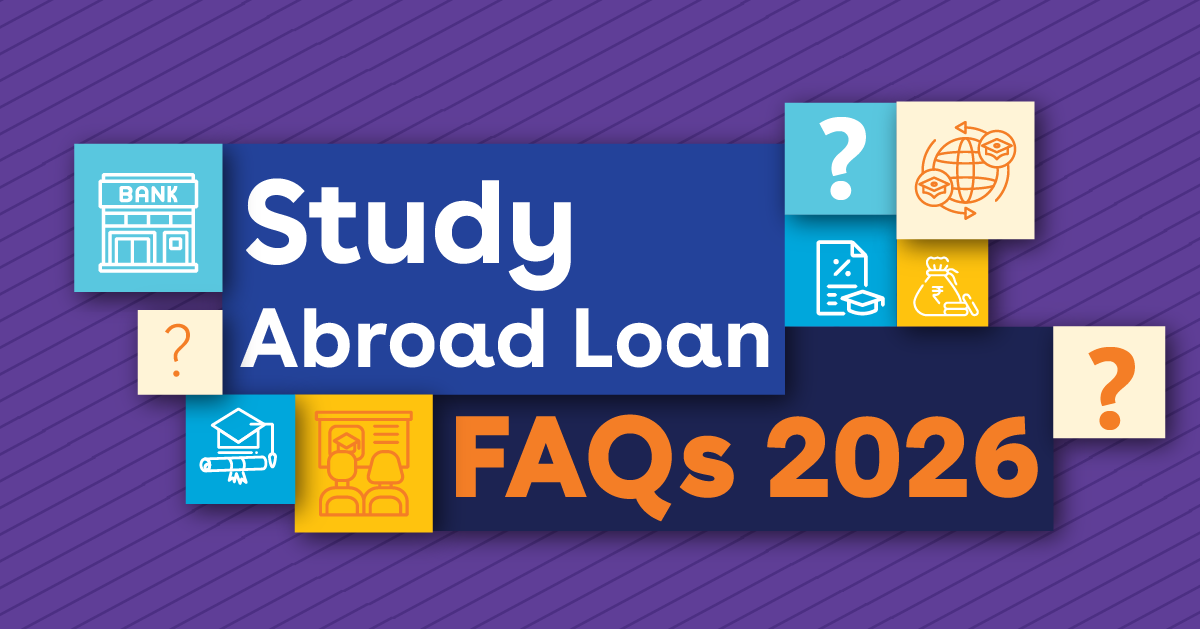Oct 30, 2025
Education Loan to Study Abroad: Impact of Dropping Out from University
Many students go abroad with the dream of a qualification from the best Foreign Universities. To fund this dream, they turn towards overseas education loans to cover the cost of education, planning to repay the loan amount after graduation. But sometimes, plans can change. Students may face unforeseen circumstances related to health, finances, or immigration that result in dropping out of the University. But what happens to the financial commitment of the loan taken out for the qualification? This question may cross the mind of students even before they apply for an overseas education loan.
Dropping out of the University isn’t a failure or permanent setback. Circumstances can change in the blink of an eye, whether one thinks about fluctuations in the job market or health challenges. Understanding the consequences of dropping out of University on one’s education loan to study abroad will help students create a clear plan of action and prevent a temporary setback from becoming a long-term financial issue. This comprehensive article will break down everything students should know about handling overseas education loan responsibilities after dropping out.
Why would Students Consider Dropping Out of the University Abroad?
The world is an uncertain place, especially for an international student. As policies change worldwide and students face challenges in the University, they may have to drop out for various reasons. The following situations are examples in which dropping out may be inevitable.
The student may face financial struggles during the course due to the rising cost of living expenses abroad.
There may be an emergency, like a sudden death in the family, illness, or an accident.
The weather or living conditions abroad may affect the health of students, prompting doctors’ orders to return to their home country.
It may be difficult for students to adjust to the accent or language of a new country, leading to cultural misunderstandings and intense homesickness.
Students may also plan to drop out due to mental health challenges caused by frequently changing norms in the study destination or safety concerns.
Once the decision to drop out has been finalized, students should discuss the impact on loans with their lender. In the next section, let us see which expenses students may owe to the lender.
How much will Students Owe for the Education Loan to Study Abroad after Dropping Out?
The first thing students do when dropping out is notify their University and start the official process. Often, the University will confirm the student’s withdrawal with their lender and stop any future tuition fee payments.
Dropping out might mean that the student has some loan balance left to be disbursed, although the amount may differ across circumstances. However, they still need to repay the remaining amount, which we will understand in detail below.
Tuition Fees
Generally, tuition fees are disbursed from the lender directly to the University’s bank account 2 or 3 times a year, depending on the fee breakup. If the student drops out of University in the middle of the academic year, they may still have to pay the tuition fees until the end of the year. This amount must be repaid to the lender, along with the added interest on the education loan to study abroad.
Living/Maintenance Costs
These are the day-to-day expenses that students incur, from groceries and travel costs. This is usually disbursed to the student’s bank account every month or every semester, depending on the lender’s terms and the student’s budget. The exact amount depends on the student’s living expenses. This amount also comes out of the education loan to study abroad, and must be repaid with the due interest.
Accommodation
Student accommodation on and off campus is usually rented out for a full academic year, if not beyond, usually protected by a rental agreement. Students may be obligated to pay the deposit amount or extra rent if they terminate the lease early, depending on the rental contract. The amount to repay to the lender depends on how much of the rent and other accommodation-related expenses were covered by the education loan to study abroad.
It is imperative to clarify the exact date of one’s termination with the University and the lender to avoid repaying any extra amount. Once the amount to repay has been determined, students need to go through the terms with their lender. Some common terms are mentioned in the next section.
Understanding Overseas Education Loan Repayment Terms after Dropping Out
The contracts for education loans to study abroad are created for the unique challenges that international students face. This is why study loans generally have different eligibility criteria for academic and financial profiles, loan disbursement schedules, and collateral requirements.
Overseas education loans often take fluctuations in currency exchange and other considerations into account. Therefore, the overseas education loan repayment terms also differ for international students, as we have mentioned below.
Flexible repayment tenures based on the moratorium period, projected income of the student, and their employment status.
Loan default procedures that may affect the student’s credit score, asset pledged as collateral, and result in penalties or additional charges.
Loan forgiveness programs for students with certain professional or personal circumstances.
Special deferment and forbearance policies for students facing financial hardship.
As we see, lenders have many ways of going about the repayment process for an education loan to study abroad, depending on their communication with the student and their policies. While students can temporarily pause their loan repayment in certain circumstances, defaulting on an overseas education loan can have some serious consequences. Next, we answer a question that students might wonder as they consider their future after dropping out from their University.
Will Students Get an Education Loan to Study Abroad in the Future if they Drop Out?
Difficult circumstances don’t last forever, and the human spirit is nothing if not resilient. Once the student resolves the issue that led to them dropping out, they may consider returning to the University to complete their degree or pursue a new qualification elsewhere. But would lenders support them in such a case, seeing as they have already dropped out before?
International students usually get many fully funded overseas education loan offers when they’re applying for their first Master’s or Bachelor’s Degree abroad. However, after the student drops out of the University, they may be unable to repay the loan and face the repercussions of loan default before they can reach an agreement or closure with their lender.
Looking for another loan immediately after dropping out may be difficult.
Students may encounter difficulties with credit scores and securing collateral.
They may get rejections from lenders or not be eligible for full funding of their subsequent degree.
Eventually, it will be possible to get a fully-funded education loan to study abroad if students invest time in building back their financial profile.
It may be possible to get an overseas education loan if students dropped out due to personal circumstances like illness or bereavement.
In many cases, having open communication with the lender can help students avoid defaulting on their education loan to study abroad. It may also be possible to cancel the loan, which we will learn about in the next section.
Can Students Cancel their Education Loan to Study Abroad if they Drop Out?
It is possible to cancel education loans to study abroad in India, but the rules and regulations differ for various lenders and loan types.
Generally, loans are only cancelled if the student cannot feasibly complete their education due to health problems, changes in their financial circumstances, or if the University impedes the completion of the course.
Students need to provide strong proof or confirmation of the circumstances that led to dropping out, whether it be medical certificates or formal notices from the University.
Cancelling an overseas education loan is often seen as a last resort, as it has a financial impact on the lenders and the students.
The loan cancellation process is difficult and requires lots of detailed documentation. Cancelling before the disbursement process starts may require a wait period and prompt the lender to keep the processing fees.
If the loan amount has already been disbursed and used, on the other hand, students are required to refund the principal amount and interest rate until cancellation.
In short, cancelling education loans to study abroad has long-term financial implications. Full loan waivers are rare, with lenders opting to offer extensions on the moratorium period, reduce EMIs, or find ways for partial repayment of the loan amount. Keep reading to know if overseas education loan insurance can help in the matter.
Does Overseas Education Loan Insurance help Students who Drop Out?
Overseas education loan insurance generally covers extreme circumstances like death or permanent disability. However, it does not cover temporary health issues, visa disruptions, or academic burnout. Therefore, its extent is usually limited and does not cover dropping out.
Most lenders request hard proof of distress for restructuring the repayment tenure or reducing the EMI or interest amount when students approach them after dropping out.
The default risk for education loans to study abroad is generally evaluated by lenders based on factors like course type, University, and the borrowers’ income and collateral.
It doesn’t take common concerns like visa revocation and financial fluctuations into consideration.
Personal insurance also has its limits for students, although it might be more comprehensive in the case of medical insurance and emergencies.
In short, overseas education loan insurance doesn’t cover most temporary circumstances that may be the reason behind students dropping out from the University. In such cases, the burden of loan repayment falls back on the student and their family. However, there are ways to temporarily pause or reduce the payments after dropping out to reduce the overall financial burden. Let us learn further in the upcoming section.
Deferment and Forbearance for Education Loans to Study Abroad
Education loans to study abroad can be tough to repay after dropping. To avoid a heavy financial burden, students can try deferment or forbearance of their loans to get temporary relief in the initial stages. Both deferment and forbearance can temporarily pause overseas education loan payments.
|
|
|
|
|
|
|
|
|
|
|
|
It is important to note that both deferment and forbearance are applied with the guarantee that the total loan amount used so far will be repaid. Next, we will see how to reduce the amount to be repaid.
Understanding Settlement of Education Loans to Study Abroad
The burden of overseas education loan repayment can become heavy on students who drop out from the University, especially if their salaries or savings are insufficient. This is where overseas education loan settlement comes into play.
When the student is unable to repay the full loan amount, they can negotiate with the lender to settle the loan for a reduced amount.
Usually, lenders in India do not offer overseas education loan settlement unless the student shows evidence of unemployment, illness, or financial hardship.
Even with evidence, the decision for settlement is only taken when recovering the full loan amount seems impossible for the lender.
Students need to submit an application with all the necessary documents to present their case for settlement of their education loan to study abroad.
In essence, dropping out from Foreign University is a tough situation, especially for students with an education loan to study abroad. Defaulting on the loan amount can have serious financial ramifications, sometimes even legal action. Most relief programs center around unforeseeable yet unavoidable situations, with strict documentation requirements and deliberate negotiations with the lender.
In such a difficult situation, seeking the help of our experts at Élan Overseas Education Loans can be a silver lining for students. We can help navigate through the storm of financial hardship and find a solution that does not overburden students or the lender. We can also share tips to make the abroad education loan process smoother and manage the responsibility of applying for and repaying an overseas education loan.
Frequently Asked Questions
1. What are the legal implications of defaulting on an education loan to study abroad?
If the student is unable to repay the loan or EMI amount for 180 days, most lenders will try to recover the due amount by seizing and selling the collateral assets. Other assets belonging to the student or their families may also be recovered.
2. How soon do missed payments affect my credit score?
It takes around 90 days for missed payments to reflect on students’ credit scores. A low credit score can impact students’ financial decisions in the future, including future loans or credit card purchases.
3. Does defaulting on the education loan to study abroad affect the co-applicant?
Yes, co-applicants and guarantors could be held legally and financially responsible for repaying the loan amount if the student is unable to do so.
4. Can I refinance my loan if I drop out?
Refinancing an education loan to study abroad is a strategy used by some students for relief from the burden of debt. When students refinance their loans, they essentially get a new loan with lower interest rates and more flexible repayment tenures. However, since this is usually done after the repayment has begun, students need to evaluate their eligibility to refinance the loan.
5. What is the overseas education loan settlement process like?
The education loan settlement process starts with an assessment stage, where the lender tries to understand whether the student is eligible for a settlement based on their financial and personal situation. This is followed by a negotiation process, and a final settlement offer by the lender. This amount is then made by the student in the timeline specified by the lender, and the loan is marked as ‘settled’.

- Share this Article
Articles on Overseas Education Loans

Student Loan for Studying Abroad Faq
Studying in a foreign country miles away from home takes courage...Jan 21, 2026

Education Loan for MBA in Ireland
As a tourist, one may associate Ireland with lush natural scenery, rich cultural...Dec 31, 2025

Education Loan for Japan
Japan, the Land of the Rising Sun, is a technological and economic marvel...Dec 29, 2025

 Login
Login